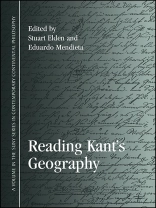Perspectives on Kant’s teachings on geography and how they relate his understanding of the world.
For almost forty years, German enlightenment philosopher Immanuel Kant gave lectures on geography, more than almost any other subject. Kant believed that geography and anthropology together provided knowledge of the world, an empirical ground for his thought. Above all, he thought that knowledge of the world was indispensable to the development of an informed cosmopolitan citizenry that would be self-ruling. While these lectures have received very little attention compared to his work on other subjects, they are an indispensable source of material and insight for understanding his work, specifically his thinking and contributions to anthropology, race theory, space and time, history, the environment and the emergence of a mature public. This indispensable volume brings together world-renowned scholars of geography, philosophy and related disciplines to offer a broad discussion of the importance of Kant’s work on this topic for contemporary philosophical and geographical work.
قائمة المحتويات
Acknowledgments
1. Reintroducing Kant’s Geography
Stuart Elden
I. The Invention of Geography: Kant and His Times
2. Immanuel Kant and the Emergence of Modern Geography
Michael Church
3. Kant’s Geography in Comparative Perspective
Charles W. J. Withers
II. From a Lecture Course of Forty Years to a Book Manuscript: Textual Issues
4. Kant’s Lectures on ‘Physical Geography’: A Brief Outline of Its Origins, Transmission, and Development: 1754–1805
Werner Stark
5. Historical and Philological References on the Question of a Possible Hierarchy of Human ‘Races, ‘ ‘Peoples, ‘ or ‘Populations’ in Immanuel Kant—A Supplement.
Werner Stark
6. Translating Kant’s Physical Geography: Travails and Insights into Eighteenth Century Science (and Philosophy)
Olaf Reinhardt
7. Writing Space: Historical Narrative and Geographical Description in Kant’s Physical Geography
Max Marcuzzi
III. Towards a Cosmopolitan Education: Geography and Anthropology
8. ‘The Play of Nature’: Human Beings in Kant’s Geography
Robert Louden
9. The Pragmatic Use of Kant’s Physical Geography Lectures
Holly Wilson
10. The Place of the Organism in Kantian Philosophy: Geography, Teleology, and the Limits of Philosophy
David Morris
IV. Kant ’ s Geography of Reason: Reason and Its Spatiality
11. Kant’s Geography of Reason
Jeff Malpas and Karsten Thiel
12 Orientation in Thinking: Geographical Problems, Political Solutions
Onora O’Neill
13 ‘The Unity of All Places on the Face of the Earth’: Original Community, Acquisition, and Universal Will in Kant’s Doctrine of Right
Jeffrey Edwards
V. Gender, Race, History, and Geography
14. Cosmopolitanism in the Anthropology and Geography
David Harvey
15. Is there Still Room for Freedom? A Commentary on David Harvey’s ‘Cosmopolitanism in the Anthropology and Geography’
Ed Casey
16. Kant’s Third Thoughts on Race
Robert Bernasconi
17. The Darker Side of the Enlightenment: A De-Colonial Reading of Kant’s Geography
Walter Mignolo
18 Geography Is to History as Woman Is to Man: Kant on Sex, Race, and Geography
Eduardo Mendieta
Contributors
Index
عن المؤلف
Eduardo Mendieta is Professor of Philosophy and Latina/o studies at Penn State University. He is the author of several books, including Global Fragments: Globalizations, Latinamericanisms, and Critical Theory, also published by SUNY Press.












